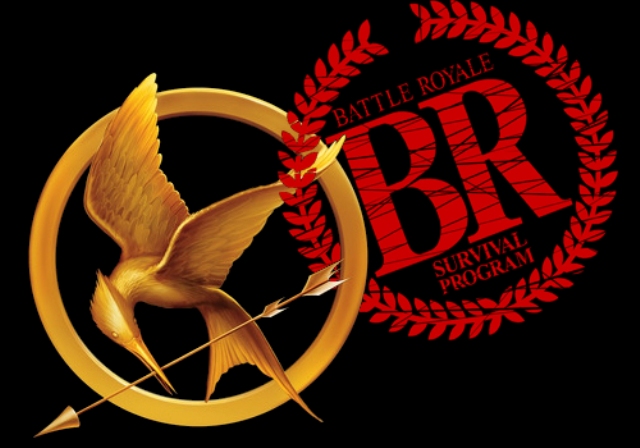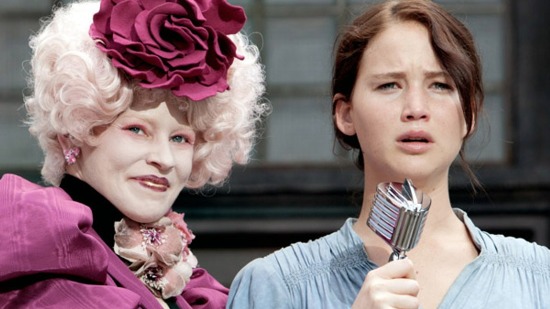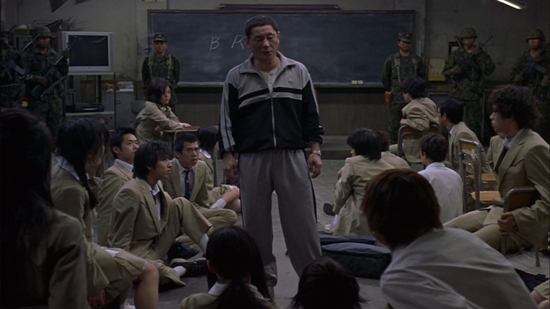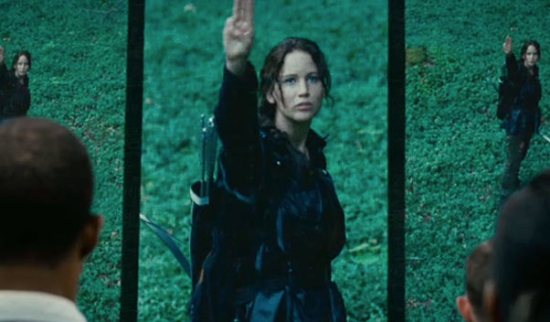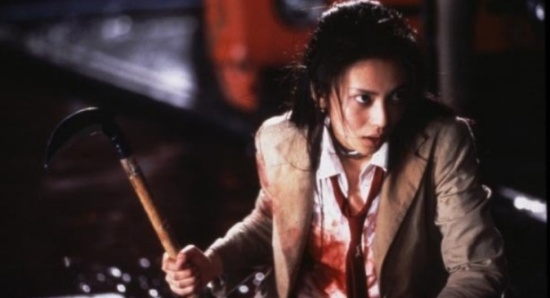It’s inevitable that sometimes two or more movies are going to be so similar that they’ll raise suspicions from audience members of idea theft. The Young Adult novel adaptation craze has been the foundation of a current swath of similarly themed movies, and it’s one that currently is being dominated and dictated by the success of the Hunger Games franchise. Based on the book trilogy by author Suzanne Collins, Hunger Games is a post-apocalyptic tale focused on the destinies of a select group of young fighters that are forced into combat for the benefit and amusement of their oppressive political system. Both the novels and the films have become monumental successes and are continuing to inspire many like-minded franchises based around many of the same themes, like this year’s Divergent and The Maze Runner. But, even though The Hunger Games is a standout series, many people have questioned it’s own originality, and have even gone as far as to claim that it was a complete ripoff of another popular story. That story happens to be the Japanese made Battle Royale series. Originally created in Manga comic form in 1999, the book quickly inspired a film adaptation that was released in 2000, which also spawned a 2003 sequel. Battle Royale precedes Hunger Games by nearly a decade, and it’s very clear that there are some strikingly close similarities between the two. They both depict young people forced into combat by an oppressive government, they both have a central love story between it’s main heroes, and they both show the characters working the system in their favor in order to undermine it. But, even with all the similarities, did Hunger Games real steal the idea, or did it do enough to differentiate itself from Battle Royale.
A simple argument in Hunger Games favor is that Battle Royale isn’t all that original either. In fact, the basis for these stories goes back a long way, as themes of oppressive governments and conformity gone horribly wrong has been present in literature and media for centuries. Just look at George Orwell’s 1984, and you can see the inspirations for much of the Hunger Games visual aesthetic. Likewise, Battle Royale’s setting on a deserted island far off the Japanese mainland recalls a similar backdrop from the Richard Connell 1924 short-story The Most Dangerous Game, which of course was all about the hunting of human beings. Other literary inspirations include the 1948 Shirley Jackson short story, The Lottery, which very directly served as an inspiration for both Hunger Games and Battle Royale. In The Lottery, a small American town selects one of their youngest citizens at random out of a basket of names to be ritually sacrificed in order for them to have a prosperous harvest season. Obviously, that random choosing from a lottery of names sounds familiar to any Hunger Games fan out there. Another influence on these movies could also be the 1982 Stephen King novel The Running Man, which later spawned the 1987 Schwarzenegger headlined film adaptation. That film not only influenced the human vs. human combat seen in Battle and Games, but it also inspired some of the sharp satire of the media seen in each, to varying degrees. Suffice to say, both Battle Royale and Hunger Games are following a long line of similarly themed stories, so to say that one is stealing from the other is ignoring the fact that they’re all part of the same trend. In the end, it’s not about the same ideas but how well they execute them in their individual stories that makes these movies distinct from one another, and as a result, they are much more different than you might think.
“May the odds be ever in your favor.”
One way in which the two are very different is in terms of scale. Battle Royale is ambitious, but is also crafted on a modest budget. Everything takes place in the same location and the visual effects are kept to a minimum. In some cases, the only effects that Royale actually employs are pyrotechnics and specialty make-up on the actors. Hunger Games on the other hand has all the visual splendor of a grand scale Hollywood epic. It’s clear that Hunger Games benefited from a full studio treatment when you see all the work put into the set design, the visual effects, and even the costumes. The dresses worn by actress Elizabeth Banks as the flamboyant character Effie Trinket probably boasted of a seven figure budget alone. But, all this works to the different movies’ strengths. Battle Royale feels very immediate and closer to reality, so a smaller scale helps to make that feel more authentic. Hunger Games is otherworldly, so it’s got to reflect that by immersing us into sights unseen, and that obviously costs a lot of money in the end. Overall, it’s the big advantage that Hunger Games has over Battle Royale. It does a much more effective job at world-building, or to put it more directly, presenting us with the why, where and when of the film’s setting. With the help of Suzanne Collins novels as the groundwork, we get a better sense of how the titular Games fits within the society, and how the characters’ struggles fit within the larger picture. Couple this with the fact that Hunger Games also retains it’s own identity because of it’s unique setting and by how well the filmmakers have brought that to life. Less capable hands may have not brought out the subtlety in the material and would have let the movie’s visuals run amok, but Hunger Games has thankfully transported us while still feeling firmly grounded.
Battle Royale doesn’t have the same amount of time, however, to explain the details of why these events are taking place. The movie quickly takes us right to beginning of the battle without presenting too much in the way of context. All we see are a group of 40 teenage students all gathered together in a rundown school on a deserted island where they’re all told that they will be thrown into forced combat with one another. Any attempt to disobey and try to escape will result in their death and the last survivor will be granted their freedom. We get just the basic outline of the rules, laid out by the overseer of the Battle, Kitano-sensai (Takeshi Kitano), who represents in a subtle way the embodiment of government oppression that’s forcing this cruel act on these kids. And it’s this subtlety that works very much to Battle Royale‘s advantage. It doesn’t waste any time plunging us into this strange new world. Instead, it lets the audience piece together all the rules and has us discover the intricacies of the plot as they happen. I particularly like how character details that weren’t apparent before come out in interesting ways as the characters are pitted against one another. Hunger Games allows character moments to happen as well, but they feel a bit more telegraphed due to the fact that the they’ve been established long before the Games even begin. When characters are thrown through an ordeal like this, different emotions come out and the characters turn to more animalistic instincts in order to survive. Battle Royale shows this in a much more interesting way, and I think that’s partially due to the blank slate that we are given with these characters from the beginning. In this case, the more visceral, small scale approach gave this type of story the edge it needed.
“Life is a game. So fight for survival and see if you’re worth it.”
The same subtlety also works well with depicting the theme of government oppression. Both stories do a good job of presenting the competitions as a means of dehumanizing the less fortunate and offering them up as fodder for the upper classes’ amusement. What I believe Battle Royale achieves to a better degree than Hunger Games is showing the face of that oppressive body on screen. In Royale, the government body is brilliantly humanized in the form of the character Kitano. Takeshi Kitano brilliantly portrays the inhuman coldness of an oppressive government through his portrayal of an unforgiving social servant. Once a school teacher to all the same students forced into competition, Kitano applies the same attitude to this inhuman practice that he would apply in the classroom. Throughout the film, he is constantly talking down to the kids, as if he was still delivering them a lecture, which is a great subtle way to reinforce the idea of how governments can devalue human life in order to get them to do what they want. Hunger Games is less subtle with it’s depiction of government oppression, showing the whole fictional land of Panem ruled over by President Snow (Donald Sutherland), a pampered aristocrat who rules with an iron fist from his lofty palaces in the Capitol. It’s made very apparent from the beginning who the bad guys are in the story, and there’s no sense of any other interesting layers with the antagonists in the Hunger Games; although Sutherland still performs the hell out of the role, and is a joy to watch. I think the reason the theme of oppression works better in Battle Royale is because of how unexpectedly it comes out of the story. It’s an added layer to a violent story-line that is very well appreciated.
“I don’t know how else to put this: Make sure they remember you.”
But, what Hunger Games lacks in one theme it makes up for in another. One thing that I did appreciate a lot from the story was it’s very shrewd observations on the role of media. The influence of propaganda is particularly focused on in the story, as is how different parties can manipulate the media to their own advantage. What I particularly like about this aspect of Hunger Games is that it works both as a subtext to the story and as a functioning element in the growth of the characters. Katniss Everdeen (Jennifer Lawrence) is depicted throughout the story as a the most skilled and resourceful fighter in the entire games, but throughout the story, we also learn her one weakness, and that’s the ability to fit within society’s expectations. Once she becomes a part of the games, Katniss must not only be a good fighter, but also be beloved by the public as well. Considering her rebellious attitude, as well as her awkwardness in front of a camera, this becomes a challenge for her. And considering that her livelihood inside the games is dependent on her ability to find sponsorship, it becomes a life and death situation as well. This is a great way to make the theme of propaganda and media manipulation work both as satire and as a plot thread in the story-line. The film does a great job of skewering the way media works, especially with the absurdity that we find so abundant in reality television. But, it also helps to define the characters as well. With it, we see that even Katniss has flaws, and by overcoming them, she’s better able to be a true hero. This is something that is only hinted at in Battle Royale, and never truly explored or explained. I’m not even sure the whole event is even televised. Only a subplot with computer hackers gives us any hints into this kind of theme in the film. So, it’s definitely a case where Hunger Games presented something very different and interesting.
There is one plot thread that did manage to become a part of both story-lines, and that’s the romantic subplot. The romantic plots are so similar in fact, that it probably is what has sparked so many claims of plagiarism among many Battle Royale fans. Both stories find two of the combatants from the same background and social class linked together from early on and bound together to the very end, relying on each other for survival. And in each story, they are also the last two to survive, subverting the rules of the competition as a result. In Battle Royale, it is love that bounds the two survivors Nanahara (Tatsuya Fujiwara) and Nakagawa (Aki Maeda) together, though their relationship is played up in an innocent way. In The Hunger Games, the love story is more complicated. Katniss has had one love back home (played by Liam Hemsworth), but during the competition, she finds herself more drawn to her friend and fellow competitor Peeta Mellark (Josh Hutcherson), whom she relies heavily on for comfort and assistance as the Games grows more deadly. Though Hunger Games has a love triangle in it’s story-line, it’s the relationship between Katniss and Peeta that drives the heart of the story more, and in that sense, it feels as much the same as Battle Royale. Both work to varying degrees, but are never the main focus. I don’t believe that it represents Hunger Games being a copycat in terms of story, however. Suzanne Collins drew inspiration from a lot of other love stories built around adversity, so the fact that it feels so similar to Battle Royale is just a byproduct of the fact that some themes have universal meaning and usually wind up going towards the same places.
“What’s wrong with killing? Everyone’s got their reasons.”
So, with two similarly plotted movies, is it true that one stole from the other. I think that history has shown that this kind of story has been done many times before, and neither is really as original as either of their fan-bases would claim. Still, they are close enough to draw comparisons and some of their similarities work better in one over the other. I do admire the subtext underneath both, showing that they are more than just a collection of brutal action scenes. But, based on my own personal tastes, I would actually give the edge to Battle Royale over Hunger Games. Games is a beautifully constructed series of films that does translate the material in a smart and engaging way. Battle Royale does, however, feel more visceral and it gets away with a lot more. Hunger Games feels like it’s shackled by the PG-13 rating that is standard for all blockbuster franchises from Hollywood. Battle Royale, on the other hand, displays everything in full graphic detail. Whenever a character dies in the movie, you feel the full impact of the horror of the moment, no matter how minor the character is. Hunger Games feels tamer because so much happens off-screen. In fact, most of the other combatants in Games remain nameless to us, and are therefore more expendable, as the movie only focuses on the main characters. That works to The Hunger Games advantage, but for me it didn’t have the same impact. Battle Royale is a very interesting import from Japanese cinema and presents a very interesting look into their culture. After all, Government oppression is something that is all too familiar in Japanese history, so it’s not surprising that they would have such a grounded view on the theme. Hunger Games by contrast plays it safe, and that’s it’s disadvantage. So in a direct competition between the two like-minded films, it turns out that the odds fall into Battle Royale‘s favor.
